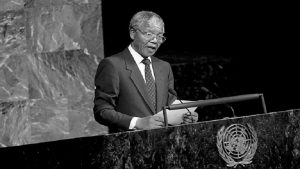Conflicts of interests are one of the main reasons for unethical conduct which leads to corruption by South African elected and public representatives, whether at local council, provincial legislature or national parliament level.
The perception of conflict of interests is as harmful to public institutions as they undermine trust in public institutions and representatives, raise doubts about their fairness and damage the credibility of public decision and policy-making processes.
Public and elective representatives are often torn between their public duties of office on the one hand, and their private interests on the other. The public duty of elected and public representatives should at all times act on the basis of serving the best and widest interest, good and welfare of society.
In broad terms a conflict of interest is when elected representatives deliberate or vote on issues in which they have a private interest or benefit which clashes with the public interest and their public duty. Such a private interest can be monetary or non-monetary. Cabinet ministers and public servants have large discretionary powers, and with it naturally come more frequent possibilities of conflicts of interest.
Many elected representatives either do not understand when they are conflicted. It could be serving personal – friends, family and business interests. It could be exclusively focusing on ethnic, regional and the representative’s home constituency.
Conflict of interests could be narrow party political – an elected representative serving party or a faction of the party’s interest. It could be the representative’s narrow focus on making decisions solely to secure re-election.
For example, many African National Congress (ANC) leaders have demanded their party elected representatives to serve to the interest of the party first, rather than the country’s interest – where the two clashes. This is clearly a conflict of interest. Similarly, many ANC representatives have prioritised serving the party leader, rather than the wider public interest – which is also a conflict of interest.
Some elected and public representatives claim that their “culture” allows them to serve narrow partisan interests, rather than the wider democratic public interest.
For example, some claim that their version of African “culture” demands of them to look after the interest of their extended family, community and ethnic group. This is one of the main reasons for post-independence ethnic divisions in many African countries, as those outside the constituencies of elected representatives violently fight against being excluded.
Others again claim that receiving gifts for “services” rendered is acceptable in their version of African culture. To be honest, no culture will allow elected representatives to solely serve their private interests or that of a small group. For another, no culture will accept corruption, bribery and self-enrichment using public resources as “normal”.
But disclosure of interests may not be enough
A first start to tackle conflicts of interest among elected representatives would be to secure a common definition of conflict of interests, and get broad societal acceptance for the definition, and then implement the rules, monitor adherence to the rules and punish those who breach it.
In South Africa, the public duty, the public interest and public welfare obligations of elected representatives are spelled out in the South African democratic constitution. Serving any other interests is unconstitutional, undemocratic and illegal.
The second, is to make it compulsory for every elected representative to complete a declaration of interests upon becoming a member of municipal council, provincial legislature and national parliament. There must be a compulsory update of initial conflict of interest declarations. In addition, elected representatives must make a declaration of interests before every hearing, debate and vote. Advocating for outside narrow interests, for example, being paid to make a certain policy proposal, decision or vote in a certain way in councils, legislatures and parliament, should never be allowed.
All declarations of interest must be made publicly available and easily accessible for ordinary citizens, civil society and the media. It is important that councils and legislatures have registers of interests which are regularly updated.
By making declarations compulsory and public will help to point out potential conflicts of interest, if any public representative is uncertain. Greater openness will minimise conflict of interest issues.
Many elected representatives appear not to know what to declare. What is declared by elected representatives is crucial. Most importantly, assets, income, liabilities, gifts and travel, and any relevant interests, must be publicly declared. Financial interests include income from employment outside parliament, legislature and council, directorships and shareholdings in companies, sponsorships and sources of election funds.
In some countries the interests of spouses and children must be declared. Given the wave of ethical breaches by elected representatives in South Africa, it may be useful to make it compulsory for the interests of spouses and children, be part of the declaration of interests.
Declaration of liabilities may be seen as an invasion of privacy, but South Africa could consider declaring liabilities above a certain threshold. The argument could be made that high indebtedness could open the elected representative to conflict of interest dilemmas.
The big question is whether it is enough to just declare an interest and then debate, participate in voting and making decisions on the conflicted issue. Countries take different approaches on this.
In Germany and the United Kingdom, legislatures have made it compulsory to declare conflicts of interests, but the conflicted member can still vote on the issue. In Australia and Canada, where it is also compulsory to declare conflicts of interests, members can still participate in a discussion of the issue in conflict, but cannot vote on it.
Sweden is stricter. It is compulsory for elected representatives to declare conflicts of interests. In Sweden, elected representatives cannot participate in whatever manner – whether debating, voting or making decisions on, at all on an issue on which they are conflicted.
South Africa could take the approach of Sweden, of not allowing any elected representative that is conflicted on an issue, to participate in the debate, discussion and vote on it.
But disclosure of interests may not be enough, however. There could be a consideration to introduce restrictions on certain activities, associations and outside interests which may negatively impact on elected representatives’ public responsibilities.
Some legislatures have “incompatibility” rulings – categories of employment and interests unsuitable to an elected representative. These include other branches of government, security forces, and the judiciary. In South Korea and France for example, elected representatives may not hold positions, whether at the executive or board level, in state-owned companies.
Some countries restrict elected representatives’ post-tenure jobs. In France, MPs are not allowed to work in any government related entity, real estate or banks after being in office. In South Korea, there is a two year prohibition on elected representatives working in the public sector following their electoral terms.
South Africa could consider a cooling off period during which elected representatives after their terms ended, are prohibited to work for state related entities.
To effectively tackle rising incidents of conflicts of interest among elected representatives, party leaders must pro-actively prohibit conduct of their parliamentary, legislature and council members that can lead to conflicts of interests.
Elected representatives who have been found to have breached conflict of interest rules are often not held accountable. Sanctions for breaching conflict of interest rules are often negligible. There has to be stronger sanctions for contravening conflict of interest rules, including public reprimand, docking pay and suspension.
Conflicts of interests are often not policed by elected peers, civil society and the media. ANC leaders, opposition parties, civil society and the media must also be more vigilant to spot, expose and shame elected representatives found breaching conflict of interest rules.
Elected and public representatives should avoid situations where their public positions could be used by themselves, family, friends or business interests, for personal gain. Furthermore, public representatives must not behave in ways which are difficult to justify to their conscience, citizens, civil society and the media.
William Gumede is Executive Chairperson of Democracy Works Foundation, Associate Professor, School of Governance, University of the Witwatersrand; and author of Restless Nation: Making Sense of Troubled Times.






